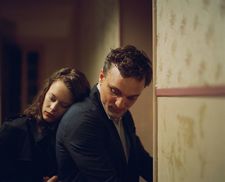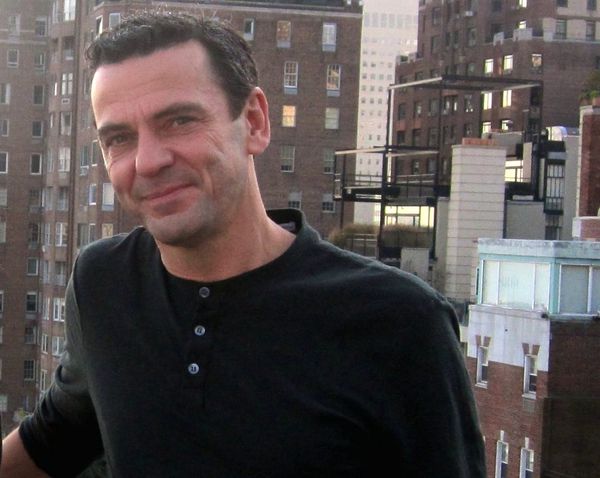 |
| Transit star Franz Rogowski on Christian Petzold: "Christian has a deep connection with ghosts. And ghosts keep coming back in his work over the past 20 years." Photo: Anne-Katrin Titze |
The Film Society of Lincoln Center Christian Petzold retrospective The State We Are In includes films with actors Nina Hoss, Benno Fürmann and Ronald Zehrfeld, shot by Petzold's longtime cinematographer Hans Fromm (Barbara; Jerichow; Wolfsburg; Something To Remind Me; Phoenix; the ghost trilogy The State I Am In, Ghosts, Yella; TV movies Dreileben: Beats Being Dead; Cuba Libre; The Sex Thief; Pilots).
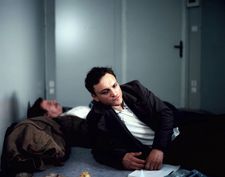 |
| Franz Rogowski as Georg in Transit: "Yeah, he's stuck. I mean, bureaucratic hell got him." |
Harun Farocki's The Interview, along with Nothing Ventured and Petzold's latest, Transit, starring Franz Rogowski and Paula Beer with Barbara Auer, Lilien Batman, Alex Brendemühl, Godehard Giese, Maryam Zaree, and Matthias Brandt (Main Slate selection of the 56th New York Film Festival), will also screen in the programme.
Transit positions Anna Seghers's novel (originally published in 1944) about a young, nameless man who escaped a concentration camp and travels through France in 1942 in the hopes to obtain a transit visa, into present-day Marseille. Like his counterpart, Georg (Franz Rogowski) finds himself among refugees and while on a mission to deliver a letter, discovers a dead writer's unfinished manuscript. There is no place like home to return to, the future is unclear and hanging by bureaucratic threads as we follow a man trapped in limbo, for decades, much longer it seems than he himself has been alive.
In many costume dramas the present of when the film was made overshadows the more or less detailed reconstruction of the past depicted and filmmakers note how relevant this particular story is for the now. With Transit, Christian Petzold takes a much bolder step in regards to movie conventions about time.
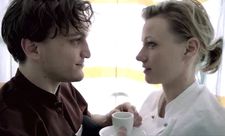 |
| Franz Rogowski with Lana Cooper in Jakob Lass's Love Steaks |
Inside the Elinor Bunin Munroe Film Center, Franz Rogowski met me for a conversation that I started with a comment on his terrific breakout performance in Jakob Lass's Love Steaks, co-starring Lana Cooper.
Anne-Katrin Titze: The first time I saw you on screen was in Love Steaks.
Franz Rogowski: Wow, you've seen it all!
AKT: I've not seen it all, no. I have seen Love Steaks and Michael Haneke's Happy End and now Transit. I was on the jury for First Time Fest where we gave Love Steaks the top prize.
FR: Nobody told me! I wasn't invited!
AKT: At the centre of Transit, I feel, is the lullaby that you sing [Abendlied by Hanns Dieter Hüsch]. A bit what Kurt Weill's Speak Low was for Phoenix. I emailed Christian [Petzold] about the lullaby and he wrote that it was his favourite and that he had to sing it to his children every night. So it's very personal for him. I had never heard it before.
FR: Me neither.
AKT: Totally new to you, too?
FR: Totally new to me, too. I didn't even like the song. But Christian has a deep connection to this song. At the end of the day, it's not about the song. It's about the situation and Georg growing up a little bit in this moment, taking responsibility for this situation. I would have chosen another song. But as an actor you also embody a director's vision and in the end it turned out fine and it was a very intimate and truthful moment that we captured.
AKT: And it's so strange because I would have expected some really old-fashioned German Guten Abend, Gute Nacht thing [In other words, Brahms's Wiegenlied].
FR: Me too, yeah.
AKT: The passport you have says Deutsches Reich. There are elements that connect to the past in the contemporary setting. I thought it was actually quite brilliant to use such a slightly bizarre tune. And I love the word Kabeljau [codfish]. I never knew I loved it, but I do.
FR: I agree. Kabeljau is an amazing word.
AKT: Can you sing one line to me?
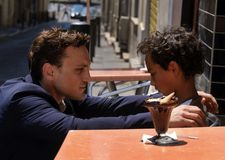 |
| Georg (Franz Rogowski) with Driss (Lilien Batman) in Transit: "He's a drifter and I think that's very dangerous as an actor to play the refugee or existential fear as a phenomenon." |
FR: I don't remember.
AKT: There's an elephant.
FR begins to sing: "Elefant kommt nach Haus. Kabeljau kommt nach Haus." [Elephant is coming home, codfish is swimming home] That's when I have a little break and then comes the Kabeljau! I remember! It's so weird, it was like two years ago and now you talk about it. The lines come back, but I'm not Georg any more. It feels different now.
AKT: He is still in Marseille. You left him there.
FR: Yeah, he's stuck. I mean, bureaucratic hell got him. He tries to get a visa, he tries to get a transit. Once he has the transit, the visa isn't valid any more. He's trapped in a loop.
AKT: It felt that way - by the creation of having the story set at the same time in 1942 and in 2018, or 2017, whenever it's supposed to be. It became a loop. You in a way were performing a ghost.
FR: Yes. Maybe you're bringing this up because Christian has a deep connection with ghosts. And ghosts keep coming back in his work over the past 20 years. I think what's great about ghosts is that they don't really set roots. They are rootless and they are figures lost in time.
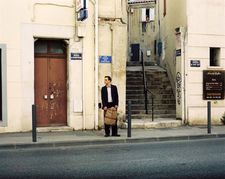 |
| Franz Rogowski on the timeless costumes in Transit: "That's perfect, because that was the aim." |
And Georg is also lost in time. He is a refugee, therefore he lost his home, but he is also a ghost that starts his journey in Germany's Thirties. He's actually born in the novel, in the book of a German writer and he finds himself in today's Marseille. A city on the edge of Europe that is dealing with immigration every day.
AKT: The 'Jungle' was still there when you filmed? You can feel it in the harbour. You sense everything that is going on off camera. Especially near the end. It's interesting, at the beginning of the film you didn't seem that much in danger. I think perhaps because audiences still have to get used to being in two times simultaneously.
FR: Yeah, but also, Georg is a drifter. There's not much he could lose. He has no family, there's no apartment or work. He's a drifter. It's also a coming-of-age movie about someone growing up, at least a little bit. And then someone discovering the power of love and all that love can do to you.
AKT: The bureaucracy, the pain-filled stories Georg has to listen to while standing in line endlessly in Marseille at the Consulate - is that something you could relate to at all? Probably not to the extent, the dread, that people can feel when the system turns against them?
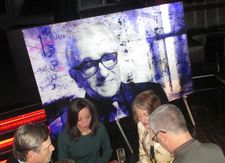 |
| First Time Fest jurors Nicholas Haden-Guest, Anne-Katrin Titze and Stephanie Zacharek awarded Love Steak top prize with Martin Scorsese looking as if he were in agreement |
FR: I think I don't really know what it feels like because I'm a very protected person. I grew up without war. I'm part of a generation that has never experienced war. For example, two days before I came here, I realised, oh no, I forgot the ESTA. Online you have to fill out a form. The consequence could have been that I was too late. If I could not get the ESTA then I could not come here. It feels existential, because I really wanted to be here.
But in the end, I mean, what is this existential fear about? It's about work, it's about money, it's about New York, it's about movies. That has nothing to do with existential fears and struggles that people in war go through. It was important for me as an actor not to embody a refugee, like the refugee.
AKT: Exactly. That's where I was heading with my question.
FR: But to embody a person that is fleeing from the Nazis. But I'm not representing the refugee, I'm representing a guy that is not even really so scared of the Nazis. He's a drifter and I think that's very dangerous as an actor to play the refugee or existential fear as a phenomenon.
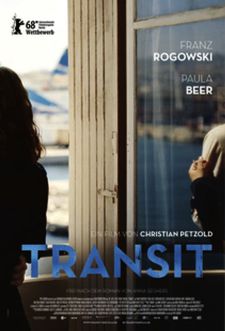 |
| Transit poster - sneak preview on November 30 at the Film Society of Lincoln Center |
It's more than the actor's performance, it's also the interesting combination of today's Marseille and these old characters from the Thirties, wearing old costumes next to a skyscraper in Marseille. This creates a space in which you can start to find your own perspective on that.
AKT: The costumes [by Katharina Ost] felt deliberately timeless to me. What you as Georg are wearing felt fine for then and feels okay now.
FR: That's perfect, because that was the aim. That they look timeless. I feel that they look old.
AKT: Because it's not the style you're wearing. I know people your age who would wear something like that.
FR: Yeah, no, no, they were designer clothes, the costumes. Hannes Roether. The jacket is Hannes Roether, it's like 2017 design.
Transit is in cinemas and available at Curzon Home Cinema now.








